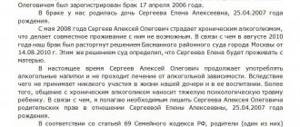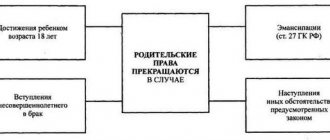Home / Family law / Parental rights / Restriction
Back
Published: 02/15/2017
Reading time: 8 min
0
533
In cases of violations of parental rights, parents may be limited in their rights by a court decision for a certain period, until these violations are eliminated or their causes are eliminated.
It is possible to remove such a restriction only in court and in the presence of a number of conditions favorable to such removal.
- Reasons for lifting restrictions
- Drawing up an application to the court and the procedure for lifting the restriction
- Judicial practice First case
- Second case
- Third case
Reasons for lifting restrictions
Deprivation or limitation of parents' rights mainly occurs when the parents' behavior poses a threat to the normal existence of children.
The court limits the parents (parent) in parental rights, in accordance with paragraph 2 of Art. 73 of the Family Code of the Russian Federation, in the following cases:
- There are not enough grounds to deprive parents of their rights;
- Depriving parents of their rights can damage the psyche of children;
- The parent has been diagnosed with a mental or other illness that poses a danger to the children living with such parent.
Parents can be fully restored to their legal rights and the restriction can be lifted, according to Art. 76 of the RF IC, on the basis of a court decision, subject to the simultaneous fulfillment of the following two conditions:
- The reasons for which restrictions on parents’ rights were established have been eliminated;
- Returning children to their parents is not contrary to their interests.
The plaintiff-parent who wishes to restore his rights as a parent must provide the court with evidence that the reasons for which he was previously limited in his rights have been eliminated.
The plaintiff needs to convince the court that he has changed his attitude towards fulfilling his parental responsibilities and the return of parental functions to him is advisable and in the interests of his children.
Depending on the reasons for which the restriction on parental rights was imposed, the court may be presented with the following evidence of eliminating such reasons:
- A certificate from a narcologist about the treatment of a parent who previously abused alcohol and long-term coding;
- Certificate of salary of the parent for the last three months;
- Certificate of regular payment of alimony payments in the proper amount;
- A medical certificate confirming recovery from the disease that caused the restriction of the parent’s rights;
- Witness testimony about changes in the parent's lifestyle;
- Certificate of increase in living space.
The court's decision largely depends on the strength of the evidence presented by the plaintiff.
Procedural nuances
The issue of preliminary determination of the order of communication with the child can be resolved during the trial. The RF IC does not prohibit a parent whose right to raise a loved one is limited from filing a claim and proving the possibility of actual communication with the child. The court may reject the claim if it determines that communication between the parent and the child will have a negative impact on the emotional state of the latter.
Expert commentary
Kamensky Yuri
Lawyer
The best option would be for the parents to agree on the procedure for communicating with the child before the trial. The nuances of each situation are taken into account. Restriction of rights is considered a forced measure and should not consist of deliberately preventing the other parent from communicating and raising the child.
If you want to restore parental rights, the parent (possibly together with a representative by power of attorney or law) must:
- try to come to an agreement with the second parent who is raising the child, or with the administration of the institution where the minor is located, to reach an agreement on the time of communication with the child (the date of the minor’s visit). You can also establish forms of communication: walking together, talking, visiting children's events;
- contact the guardianship authority with a request to facilitate the abolition of restrictions on parental rights. In practice, court decisions depend on the position of officials. If the authorities are against it, then great attention will need to be paid to collecting evidence. It will be needed in order to confirm the socially approved lifestyle of the parent, his employment, income, marital status;
- file a claim in court. Cancellation of restrictions is possible only by court decision.
The procedure depends on the reasons why the parent was deprived of the right to personal education of the child. If a parent is seriously ill, stabilization of his health condition, including long-term remission, will be required. Then the guardianship and the court study the submitted medical documentation. If rights are limited due to reasons of a social and (or) interpersonal nature, it will be necessary to convince the guardianship authorities and the court that the parent has corrected his behavior.
The conclusion of the guardianship authority is made on the basis of an inspection report of the parent’s living conditions and lifestyle. Specialists come to the parent’s home and study their living conditions. Guardianship authorities can check the accuracy of the information provided about the parent’s employment and study his financial situation. Guardianship also has the right to use the opinion of a child psychologist on the nature of the relationship between the minor and the parent with limited rights. The conclusion of guardianship is also possible at the request of the court.
Drawing up an application to the court and the procedure for lifting the restriction
Parents who have had their rights restricted usually go to court to have this restriction lifted. At the court hearing, a prosecutor and an employee of the guardianship authorities must be present, representing in court the interests of minor children in respect of whom the plaintiff had limited rights.
To restore his rights, a parent must draw up a statement of claim, indicating himself as the plaintiff, and the guardianship authority as the defendant.
The body of the application (main text) should consist of three main parts:
- Descriptive part;
- Evidence;
- Resolution part.
In the first part, the plaintiff indicates the fact of his restriction in the rights of a parent and the reasons for such restriction, indicating the date of the decision and the data of the children in respect of whom the plaintiff had limited rights.
Further (in the information part) the plaintiff indicates the elimination of such reasons and provides evidence, attaching relevant certificates.
In the operative part, the plaintiff asks the court to lift the previously imposed restriction, restore himself to parental rights, and return the children, citing the circumstances listed in the evidentiary part.
A sample statement of claim to cancel the restriction of parental rights can be downloaded here.
The application must also indicate your own data and attach all the collected evidence, as well as a copy of the marriage or divorce certificate and the birth certificate of the children.
The court makes a decision in the interests of the children and taking into account the opinions of the guardianship authorities and the prosecutor present at the meeting.
When deciding the issue of returning a child to his parents, the court must take into account his opinion, in accordance with paragraph 2 of Art. 76 IC RF.
Execution of a court decision to restore parents to their rights includes:
- Notification of the court decision to the civil registry office within three days from the announcement of the verdict;
- Returning the child to the parents;
- Resumption by parents of the actual exercise of their rights.
Divorce during pregnancy on the initiative of the wife is allowed, but on the initiative of the husband - not. Are you getting a divorce and your apartment is under mortgage? How to divide it in this case can be found here. How is the place of residence of children determined if parents divorce? Our article is devoted to this issue.
1.3. Restriction of parental rights and its cancellationRestriction of parental rights is the removal of a child from a parent without deprivation of parental rights. Depending on the guilt of the parent in his behavior, this measure can act both as a measure to protect the rights of the child and as a measure of responsibility. The basis for its use is the danger of leaving a child with a parent in the following cases. 1. Due to circumstances beyond the will of the parent. For example, mental disorder, tuberculosis, other illness of the parent, excluding the possibility of him exercising parental rights properly, a combination of difficult circumstances, and others, 2. Due to the guilty unlawful behavior of the parent in the absence of sufficient grounds for deprivation of parental rights. For example, leaving a child unattended, family scandals due to parental consumption of alcoholic beverages, and others. In this case, restriction of parental rights may act as a temporary measure preceding the deprivation of parental rights. If within 6 months after the court makes a decision to limit parental rights, the parent does not change his behavior, then the guardianship and trusteeship authority is obliged to file a claim for deprivation of parental rights. In the interests of the child, this period may be reduced. Restriction of parental rights is considered by the court in the manner of claim proceedings. Close relatives of the child, the child himself upon reaching the age of 14, bodies and institutions charged by law with the responsibility for protecting the rights of minor children, educational and other institutions, and the prosecutor can make a corresponding request. When preparing a case for trial, the judge must notify the parent who does not live with the child about the time and place of the trial and explain that he has the right to demand that the child be transferred to him for upbringing. When considering a case on restriction of parental rights, the prosecutor and a representative of the guardianship and trusteeship authority, as well as a child who has reached the age of 14, must necessarily participate. When resolving a dispute, the court finds out whether there are grounds for limiting parental rights, whether the parent is guilty, the presence of a mental illness, as well as whether there are grounds for changing behavior and improving his attitude towards the child. Evidence in the case may include an act of the guardianship and trusteeship authority on an examination of the child’s living conditions, evidence of the parent’s guilty behavior, characteristics of the defendant and the persons who are raising the child. The prosecutor and the guardianship and trusteeship authority give opinions on the advisability of limiting a particular person’s parental rights. When considering the case, the court also decides the issue of collecting child support. When resolving a dispute, it is possible to question a minor at a court hearing in order to clarify his opinion on the issue under consideration (Article 57 of the RF IC). It is carried out by the court, taking into account the age and development of the child, in the presence of a teacher, in an environment that excludes the influence of interested parties on him. Before conducting the survey, the court must find out the opinion of the guardianship and trusteeship authority whether his presence in court will have an adverse effect on the child. The court decision on restriction of parental rights must indicate to whom the child is transferred for upbringing: the other parent, the guardianship and trusteeship authority or the guardian (trustee), if he has already been appointed in the prescribed manner. If it is impossible to transfer the child to another parent or in the event of restriction of the parental rights of both parents, when a guardian (trustee) has not yet been appointed, the child is transferred by the court to the care of the guardianship and trusteeship authority (Clause 4 of Article 74 of the RF IC). Within 3 days from the moment the decision enters into legal force, the court sends an extract from the court decision to the civil registry office at the place of state registration of the child’s birth. Limitation of parental rights as a measure to protect the interests of the child applies only to parents. It entails the loss of only certain rights by parents. These include: - the right to personal education of the child; — the right to live together with a child; — the right to represent and protect the interests of the child; — the right to claim the child from other persons; - the right to be an adoptive parent; — the right to be appointed as a guardian (trustee); — the right to be a foster parent; - the right to receive benefits and state benefits established for citizens with children. The issue of a parent’s right to communicate with a child is more difficult to regulate. According to Art. 75 of the RF IC, parents whose parental rights are limited by the court may be allowed contact with the child if this does not have a harmful effect on the child. Contact between parents and a child is permitted with the consent of the guardianship and trusteeship authority or with the consent of the guardian (trustee), the child's adoptive parents or the administration of the institution in which the child is located. Property legal relations between the parent with limited parental rights and the child are preserved. The Family Code of the Russian Federation allows for the abolition of restrictions on parental rights. This issue is also considered by the court in the procedure of claim proceedings. The claim to cancel the restriction is filed by the parent himself, who has limited parental rights. The defendant is the person who filed the claim for restriction of parental rights. As a rule, simultaneously with this application, a request for the return of the child to the parent is also considered. The case is considered with the mandatory participation of the guardianship and trusteeship authority. He is obliged to conduct an examination of the living conditions of the child and the parent, as well as present to the court an examination report and a conclusion based on it on the merits of the dispute, which is subject to evaluation in conjunction with all the evidence collected in the case. The basis for canceling the restriction in parental rights is the elimination of the circumstances due to which the parent was limited in parental rights (for example, the recovery of the parent, the reversal of a court decision declaring him incompetent, a change in the conditions and lifestyle of the parent, as well as his behavior and attitude towards raising the child ). The main criterion in resolving a dispute is the interests of the child: if the child objects to the lifting of the restriction, the court has the right to refuse to satisfy the claim. The court's decision to cancel the restriction of parental rights is the basis for restoring parental legal relations in full.
Arbitrage practice
A frequent basis for limiting parents' rights is the fact of alcohol abuse.
First case
Thus, citizen A in July 2013 was limited in her rights in relation to her two minor children by the Baumansky District Court of Moscow. The reason for the restriction was A's abuse of alcohol and inadequate care of her children, and A often spent the night outside the home where she lived with her husband and children. Five months later, citizen A applied to the court for restoration of parental rights, reporting that she had undergone treatment at a drug treatment clinic for alcoholism. The husband confirmed at the court hearing that the plaintiff stopped disappearing at night and drinking alcohol, and also got a job (the court was provided with an extract from her work record book).
An employee of the guardianship authorities confirmed positive changes in the family, and the court, guided by Art. 76 of the RF IC, restored A to her rights as a parent.
Second case
The Pskov City Court decided to limit the parental rights of citizen S for malicious evasion of alimony payments, and also warned the defaulter about the possible complete deprivation of his rights as a parent if he continues to evade the maintenance of his minor son. After three months, citizen C paid off all arrears of alimony and began to regularly make payments, which the court was notified about in a statement of claim for restoration of parental rights.
The court, having considered the case of S, decided to restore the plaintiff in his rights as a parent, but left the son to live with his mother, taking into account the child’s desire for this, voiced in the presence of a psychologist.
Documents for canceling the restriction of parental rights.
According to the provisions of Art. 132 of the Civil Procedure Code will require additional documents to be attached to the statement of claim.
These include:
- a court ruling restricting the rights of the mother and (or) father;
- decisions of the authority related to the establishment of guardianship (trusteeship) over a minor;
- passports;
- certificates of birth of a child. It is acceptable to provide an extract from the civil registry office certifying that the applicant is the parent of the child.
In addition to the above acts, the plaintiff is required to prepare:
- characteristics by place of employment;
- certificates received at the place of registration;
- written testimony of witnesses;
- medical reports proving the absence of mental disorders.
Additional documents proving the facts stated in the application cannot be presented in the form of an exhaustive list.
A package of specific acts is selected depending on the situation in the family.
What then?
The result can be either the correction of the last mistakes in upbringing and a firm return to the path of strong moral foundations, or a complete cessation of relations with the child. If the factors that caused the restriction of parental rights are not eliminated by the culprits, their complete deprivation will become an inevitable and natural result. So this act by the state can be considered as a final warning to adults on the topic of parental responsibility.
Having made the appropriate decision, the court sends an extract about it to the civil registry office at the place where the child’s birth record was registered. This is done within three days. The result is the inability of guilty citizens to participate in the educational process of their own son or daughter, and sometimes to exert at least some influence on the growing personality. In difficult cases, they may be prohibited from even regular meetings with the child, or they may only be held in the presence of a specialist teacher.
At the same time, you should know that, like deprivation of rights, restriction has nothing to do with exemption from the need to financially support a child. Alimony for him is assigned in any case in accordance with Article 74 of the RF IC.
A person with limited rights to a child is allowed to meet with him if there is no threat of causing mental, moral or other damage to the latter, as well as to his health and well-being (Article 75 of the RF IC).








